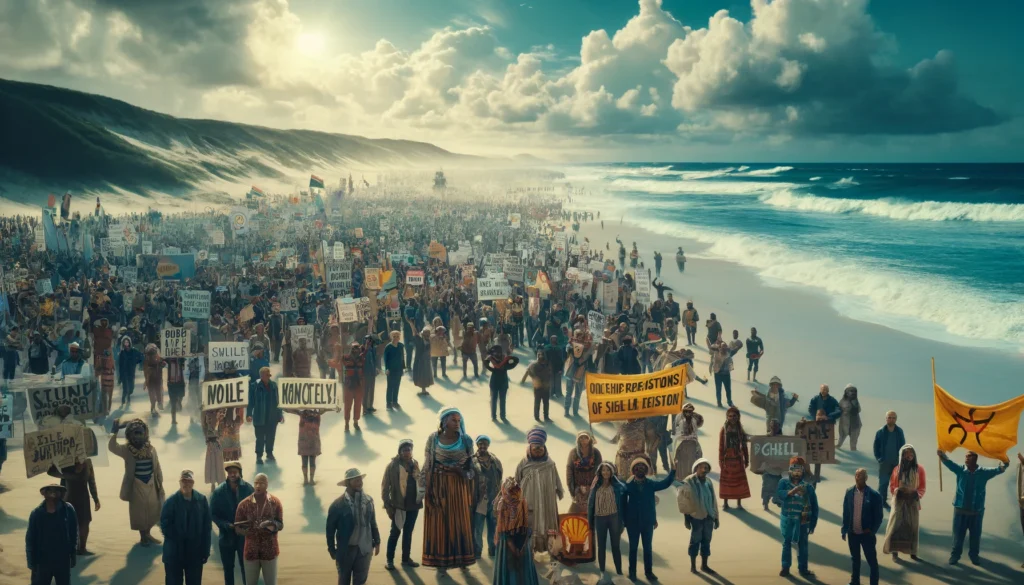
Sinegugu Zukulu and Nonhle Mbuthuma: Guardians of South Africa’s Wild Coast
By Darius Spearman (africanelements)
Support African Elements at patreon.com/africanelements and hear recent news in a single playlist. Additionally, you can gain early access to ad-free video content.
In a remarkable achievement, Sinegugu Zukulu and Nonhle Mbuthuma have jointly won the prestigious Goldman Environmental Prize for Africa in 2024 (The Goldman Environmental Prize). These courageous environmental activists from South Africa have tirelessly fought to protect the country’s Wild Coast from destructive titanium mining. Despite facing vilification and death threats, they have remained steadfast in their campaigns.
Sinegugu Zukulu: Educator, Activist, and Advocate
Sinegugu Zukulu, 54, is an educator, social and environmental activist, and tourist guide born in Pondoland on the Wild Coast (Sustaining the Wild Coast). He passionately advocates for the rights of indigenous communities affected by extractive industries across South Africa. Moreover, Zukulu favors bottom-up, locally-driven development that benefits local people over imposed projects. In fact, he has authored over ten books, including “The Medicinal and Charm Plants of Pondoland” (Sustaining the Wild Coast).
Nonhle Mbuthuma: Co-Founder of the Amadiba Crisis Committee
Nonhle Mbuthuma, 46, co-founded the Amadiba Crisis Committee (ACC) in 2007. She established it to unite community members from five villages in opposition to the proposed mining (Wild Law Institute). Mbuthuma grew up in Sigidi village. Additionally, she has outspokenly opposed plans to build a toll road and allow large-scale open-cast titanium mining in her community’s ancestral lands (Wild Law Institute).
Fighting Against Mining Interests
Zukulu and Mbuthuma argue that the Australian mining company Mineral Commodities’ proposed Xolobeni mine would displace local communities. Furthermore, it would destroy ecologically sensitive coastal dunes and threaten their traditional livelihoods (Yale Environment 360, The Guardian). As a result, the activists have taken the mining company and the government to court. They aim to establish the right of indigenous communities to say no to mining on their ancestral lands (The Guardian).
A Landmark Victory
In November 2018, the Pretoria High Court ruled that the Minister of Mineral Resources cannot grant mining rights. This is without the full and formal consent of the Xolobeni community. Consequently, it was a landmark decision for indigenous land rights in South Africa (Wikipedia). However, the government has continued to support the titanium project. As a result, Zukulu and Mbuthuma remain vigilant in their efforts to protect the Wild Coast.
Sinegugu Zukulu and Nonhle Mbuthuma: Leading the Fight Against Shell’s Wild Coast Exploration
Sinegugu Zukulu and Nonhle Mbuthuma have led the battle against Shell’s plans to conduct seismic oil and gas exploration off South Africa’s ecologically sensitive Wild Coast. In 2021, Shell announced it would start seismic blasting to search for offshore oil and gas reserves in the region (The Goldman Environmental Prize). As a result, Zukulu and Mbuthuma organized local communities to oppose Shell’s plans. They argued the seismic surveys would harm marine life that local people depend on. Moreover, the surveys would violate their ancestral rights to the ocean (The Goldman Environmental Prize, Daily Maverick).
Zukulu’s Legal Challenge and Mbuthuma’s Activism
Zukulu, director of the environmental group Sustaining the Wild Coast, filed the founding affidavit in a lawsuit. The lawsuit challenged Shell’s exploration rights (FairPlanet). Meanwhile, Mbuthuma, spokesperson of the Amadiba Crisis Committee, asserted Shell’s plans were “capitalist extraction and destruction of humanity’s common future” (FairPlanet). Together, they mobilized grassroots resistance and legal challenges against the oil giant.
A Landmark Victory in Court
In September 2022, the High Court ruled Shell’s exploration rights had been granted unlawfully. Consequently, this marked a major victory for the activists and communities (The Goldman Environmental Prize). The court found Shell failed to properly consult affected communities. Additionally, the government did not adequately consider potential harms to livelihoods, cultural rights, and climate change (The Goldman Environmental Prize). As a result, this landmark ruling set an important precedent for indigenous and environmental rights.
The Fight Continues
However, Shell and the government have appealed the ruling. Therefore, Zukulu and Mbuthuma vow to continue the fight (Climate Justice Central). In fact, Mbuthuma even occupied a Shell oil platform in the North Sea in early 2023. She protested the company’s ongoing oil and gas drilling (Greenpeace International). Consequently, their determination to protect the Wild Coast and challenge fossil fuel extraction remains unwavering.
In summary, Zukulu and Mbuthuma have been central figures in the legal and activist battle. They aim to stop Shell’s seismic blasting and oil exploration off the Wild Coast. Their goal is to protect the marine environment and their communities’ rights. As a result of their leadership, they helped secure a landmark court victory against the oil giant in 2022 (The Goldman Environmental Prize).
Global Recognition
The Goldman Environmental Prize has now recognized Zukulu and Mbuthuma’s tireless environmental and human rights advocacy. It is the world’s foremost award for grassroots environmental activism (Wikipedia). As joint recipients for Africa, their work highlights the ongoing struggle of indigenous communities. These communities are against extractive industries that threaten their lands, livelihoods, and traditional way of life. In conclusion, Zukulu and Mbuthuma’s unwavering commitment to protecting the Wild Coast serves as an inspiration to environmental defenders worldwide.
About the author
Darius Spearman is a professor of Black Studies at San Diego City College since 2007. He has authored several books, including Between The Color Lines: A History of African Americans on the California Frontier Through 1890. You can visit Darius online at africanelements.org.
